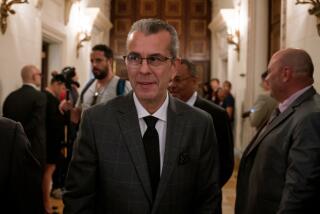Afghan envoy sees runoff
- Share via
WASHINGTON — Afghanistan’s disputed presidential election probably will be decided by a runoff contest, the country’s ambassador to the United States said Thursday, a development that would add new uncertainty to the Obama administration’s tortuous deliberations over Afghanistan policy.
Ambassador Said T. Jawad, a former close advisor to Afghan President Hamid Karzai, predicted the runoff in an appearance Thursday before a Washington research organization. His comment was the first acknowledgment from a senior Afghan official that a runoff is more likely than a declaration that Karzai defeated his main challenger, former Foreign Minister Abdullah Abdullah, in the fraud-tainted August vote.
The Electoral Complaints Commission, a United Nations-backed group of mostly foreign experts, is expected to release its judgment on complaints of fraud by Saturday. That in turn would open the way for the Independent Election Commission, an Afghan body, to judge whether Karzai had received the 50% of the vote needed to avoid a runoff.
Indications had been growing that the U.N.-backed body was preparing to invalidate enough votes for Karzai to put him below the threshold of victory. This week, a Karzai ally, Mustafa Barakzai, quit the panel, citing “foreign interference” in decision making.
The tarnished election was one of the major reasons that President Obama ordered a reconsideration of the ambitious U.S. policy on Afghanistan that was set forth only seven months ago.
U.S. officials have looked favorably on the idea of a runoff, believing it might convince ordinary Afghans that the new government does in fact reflect their preferences.
But it could also further snarl the administration’s policy review because it could take until spring to complete the runoff process, leaving the leadership of war-torn Afghanistan uncertain until then.
Administration officials have been trying to decide how to reshape their military and rebuilding policy on the country, but they are reluctant to decide on a course without first knowing whether they must continue to deal with a central government that many Afghans consider illegitimate.
Jawad, speaking to the U.S. Institute of Peace, said it would be difficult for Afghan authorities to organize a runoff within two weeks of the fraud investigation results, as called for in the Afghan Constitution.
Because of the rapid approach of winter, he said, the election may not be possible until March or April.
In an interview with The Times, Jawad said such a delay, throwing governance into limbo, would cause “the worst kinds of problems” for Kabul.
The widespread fraud that has come to light since the Aug. 20 vote, in which the initial count gave Karzai a 54%-to-28% lead over Abdullah, has been a major blow to the Obama administration’s plans. At a time when U.S. military efforts were losing traction, the tainted vote sparked questions about whether the U.S. should be sacrificing troops and spending billions of dollars in partnership with a government perceived by many Afghans as illegitimate.
Administration officials have been holding meetings on Afghanistan policy, hoping to decide on a course within the next several weeks.
But they have been under pressure from conservative critics on Capitol Hill, including Sen. John McCain (R-Ariz.), who have urged them to waste no time in reaching a decision on whether to order the 40,000-troop increase preferred by Army Gen. Stanley A. McChrystal, the U.S. and allied commander in Afghanistan.
Also looming is the possibility that the next Afghan government could be formed as a power-sharing arrangement between the Karzai and Abdullah factions. U.S. officials believe such a deal could give the new government greater legitimacy with a public that has been deeply unhappy with the Karzai administration.
Jawad, in his comments at the institute, warned against such a deal. He said the parties would be tempted to install allies who represent local constituencies but would not be competent to handle their jobs.
Obama administration officials have been frustrated with Karzai, but they have been uncertain about their prospects with Abdullah.
Jawad offered a bit of his own criticism of the Obama administration. Though he said the relationship between Afghanistan and the U.S. was strong, he suggested that the new leadership in Washington was not always realistic.
The attitude was sometimes “ ‘Let’s just get President Karzai and we’ll invite the Afghans and Pakistanis over for tea and we’ll resolve all the issues,’ ” he said.
--
Times staff writer Laura King in Kabul contributed to this report.
More to Read
Sign up for Essential California
The most important California stories and recommendations in your inbox every morning.
You may occasionally receive promotional content from the Los Angeles Times.











